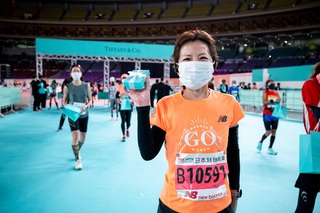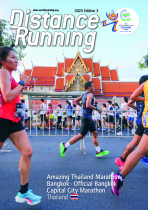Race news Nagoya Women’s Marathon
30 March 2021, 3pm UTC
Nagoya: 4704 runners and no covid cases
Nagoya Women’s Marathon
Sun 14 March 2021
The Nagoya Women’s Marathon 2021, the largest women’s marathon in the world, was held on Sunday, 14 March 2021 - the first mass participation road race to be held in Japan since the Covid-19 pandemic started.
From top elite athletes to general runners, a total of 4,704 women runners participated in the race and experience the joy of running on the city streets of Nagoya.
To prevent the spread and transmission of Covid-19, various measures were taken at all event sites throughout the event period. We established the Covid-19 Control Office with medical professionals, local governments of the City of Nagoya and Prefecture of Aichi, and the Japan Association of Athletics Federations (JAAF) within the Marathon Organizing Committee, and formulated and implemented an infection control plan in accordance with the JAAF’s Guidance on Resumption of Road Racing and advice from medical experts and local government officials. We would like to share some of the key measures as below.
At Race Entry
- The field was reduced from 22,000 to 11,000 (domestic residents only) at the time of race entry
- An option was given to all registered participants to switch from in-person racing to virtual racing after a state of emergency was declared by the Japanese government in Aichi Prefecture in January 2021.
- The state of emergency was lifted on February 28, 2021, and the Nagoya Women’s Marathon 2021 was held with the 5,000 participants who chose to run the in-person race.
- Runners residing outside Japan were accepted only for the virtual race due to international travel restrictions.
Protocols for All
- Wear masks at all times (except for runners during competition)
- Sanitize hands frequently (on arrival, after finish, before and after using the toilet, etc.)
- Check temperature at home and on arrival (Anyone with a fever of 37.5 degrees Celsius or higher are refused participation)
- Monitor, record and submit health condition and body temperature (via a web form) for 7 days prior to race day
- Monitor and report any poor health condition or positive Covid case for 14 days after race day
At Competition
- Runners must wear masks before start
- Social distancing at the starting blocks (> 1m between runners)
- Gradual start by each starting block
- Covered water at water stations to prevent droplets
- Individually packaged food at refreshment stations and hand sanitization before taking them
- Hand sanitization and face masks distributed after finish
- Social distancing at the dressing area and limited use to 15 minutes.
For Volunteers
- All volunteers were provided with face masks, face shields, and portable alcohol disinfectant, as well as additional equipment (e.g., globes) depending where they were assigned.
At the Marathon Expo
- Booth setting, flow design, and entry restriction to avoid the ‘Three Cs’: high risk situation of COVID-19 transmission defined by Prime Minister’s Office of Japan and Ministry of Health, Labour and Welfare: Crowded places with poor ventilation, Close-contact settings and Confined spaces.
All visitors were required to provide their name, address and contact information via an admission form at the entrance (for contact tracing purposes)
Crisis Management
- Establishment of a crisis management plan for potential scenarios
- A private emergency vehicle was stationed for transport of suspected Covid-19 patients
Course Management
- Public announcements made on TV and in newspapers to discourage cheering and spectating along the roadside
It has been more than two weeks since race day, but thankfully we have not received any report of infection or suspected case as of 29 March. This year’s race was an extremely challenging event to prepare, coordinate and realise. We have deepest and most sincere gratitude for runners who participated and volunteers, sponsors and all the concerned personnel for their support. We wish good health to all and the earliest possible end to the pandemic.
Result
marathon
Women
| 1 | Mizuki | MATSUDA | JPN | 2:21:51 |
| 2 | Sayaka | SATO | JPN | 2:24:32 |
| 3 | Natsumi | MATSUSHITA | JPN | 2:26:26 |
| 4 | Mirai | WAKU | JPN | 2:26:30 |
| 5 | Hanae | TANAKA | JPN | 2:26:49 |






